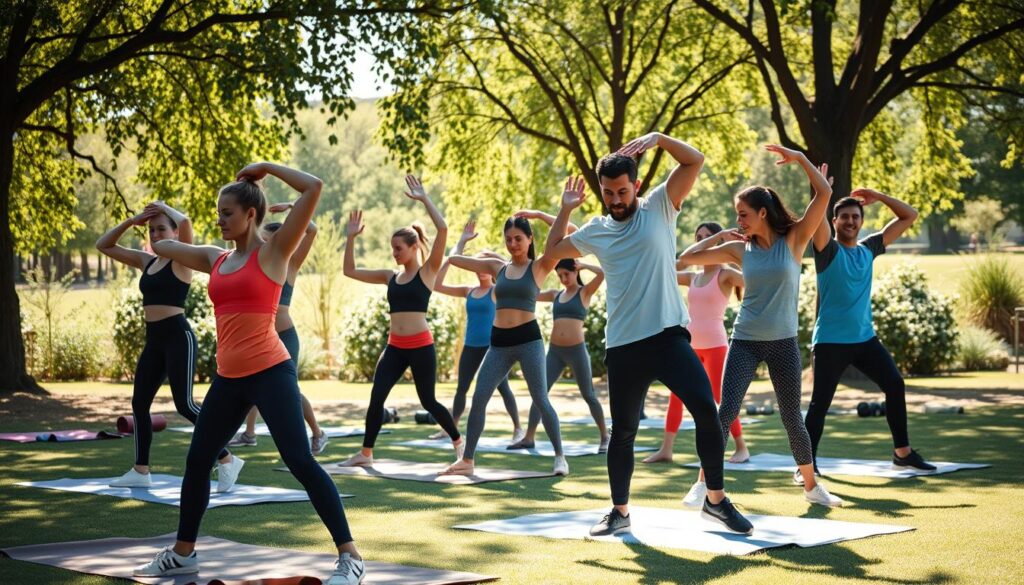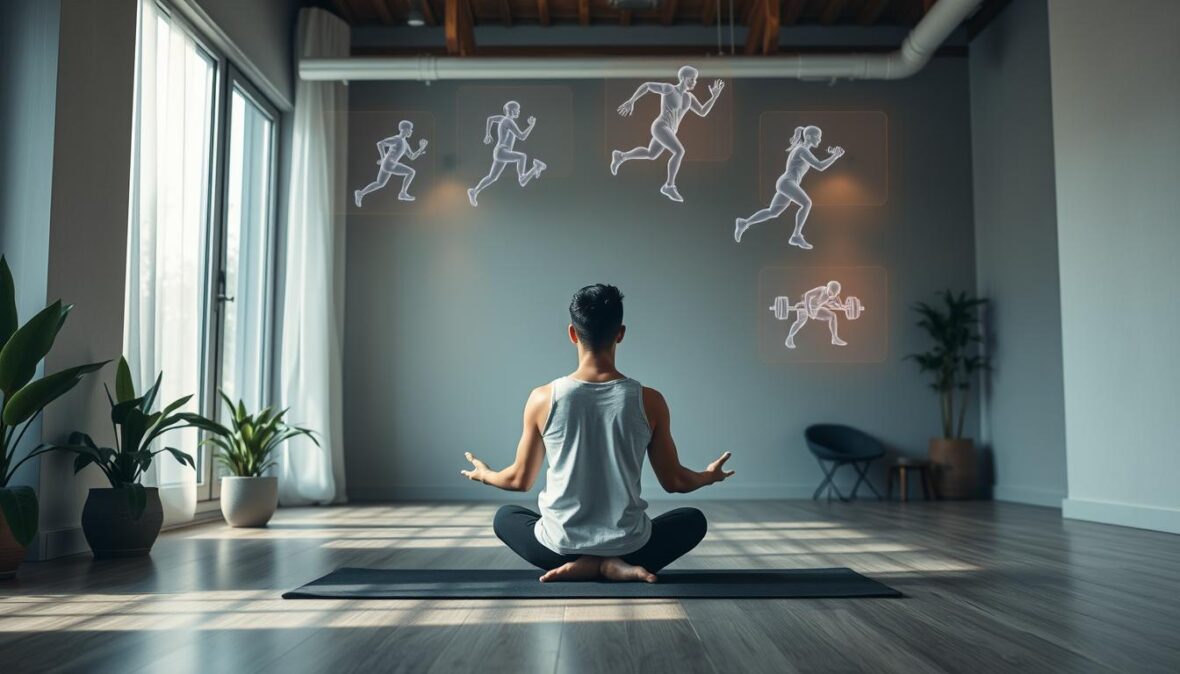
Getting ready for a physical fitness test can feel overwhelming. But, with the right strategy, you can enhance your fitness and pass with flying colors. A good fitness testing guide is crucial. It helps you focus on training, nutrition, and mental preparation.
It’s not just about exercising. You need to practice smartly, knowing what the test will cover. This targeted approach boosts your score and confidence on test day.
Key Takeaways
- Understand the specific requirements of your physical fitness test
- Create a tailored training plan focusing on test components
- Pay attention to nutrition and hydration for peak performance
- Practice mental preparation techniques to boost confidence
- Follow a strategic warm-up routine on test day
- Avoid common mistakes in training and test-day preparation
Understanding Physical Fitness Test Requirements
Knowing what to expect in a PT test is key to success. Fitness tests come in various forms, each designed to measure different aspects of physical readiness. Let’s break down the common elements you’ll encounter when completing the tests.
Common Test Components
Most fitness tests include exercises that assess strength, endurance, and flexibility. You might face push-ups, sit-ups, and a timed run. Some tests add pull-ups or a swim. Familiarizing yourself with these components helps in interpreting fitness tests accurately.
Scoring Standards and Benchmarks
Each PT test has its own scoring system. Typically, you’ll earn points for each exercise based on your performance. These points add up to determine if you pass. Knowing the benchmarks for your age and gender group is crucial for setting realistic goals.
| Exercise | Minimum | Maximum |
|---|---|---|
| Push-ups | 20 | 60 |
| Sit-ups | 30 | 80 |
| 2-mile run | 18 minutes | 13 minutes |
Test-Specific Guidelines
Each fitness test has unique rules. Some may allow short rest periods between exercises, while others flow continuously. Pay attention to form requirements, as improper technique can result in uncounted reps. Understanding these guidelines is essential for successfully completing the tests and achieving your best score.
What to Do Before a Fitness Test
Getting ready for a fitness test needs careful planning. The steps you take before the test can really impact how well you do. Let’s look at some important things to do before your test.
First, learn about the test and what it covers. Knowing this helps you focus your training. Make a countdown calendar to mark key days:
- Two weeks prior: Increase exercise intensity
- One week prior: Taper workouts
- Three days prior: Light activity only
- Day prior: Rest and mental preparation
The day before your test is very important. Make sure to get lots of sleep, drink water, and eat well. Don’t try new foods or do hard workouts that might make you sore.
Get your test day things ready the night before:
| Item | Purpose |
|---|---|
| Water bottle | Stay hydrated |
| Comfortable clothes | Ease of movement |
| Proper shoes | Support and traction |
| Light snack | Energy boost |
| ID and paperwork | Check-in requirements |
On test day, wake up early and have a light breakfast. Do some gentle stretching. Arrive at the test place early to warm up and get ready mentally. By following these tips, you’ll be ready to do your best on test day.
Strategic Training Plan Development
Creating a strategic training plan is key to acing your physical fitness test. A good plan helps improve endurance, strength, and focuses on specific test parts.
Building Endurance and Strength
Include cardio and aerobic exercises in your routine. Begin with 20-minute sessions and increase both time and intensity. Add strength exercises like pull-ups and push-ups to boost muscle power.
Targeting Test-Specific Exercises
Focus on exercises that match your test’s needs. For a 1.5-mile run, practice timed runs often. For upper body, alternate between pull-ups and push-ups in your workouts.
Progressive Training Schedule
Make a schedule that gets harder over time. Begin with simple exercises and add tougher ones gradually. This method avoids burnout and lowers injury risk.
| Week | Cardio | Strength | Test-Specific |
|---|---|---|---|
| 1-2 | 20 min jog | 10 push-ups, 3 pull-ups | Practice form |
| 3-4 | 30 min run | 15 push-ups, 5 pull-ups | Timed exercises |
| 5-6 | 40 min interval training | 20 push-ups, 8 pull-ups | Full test simulation |
Adjust your plan as you progress and based on your test needs. Sticking to your training is crucial for the best results in your physical fitness test.
Nutrition Strategies for Peak Performance
Choosing the right foods is key to acing your fitness test. Eating well helps you perform at your best when it matters most.
Pre-Test Meal Planning
https://bodygoalshub.com/healthy-recipes-nutrition-facts-eat-smart-well/Plan meals that boost your energy. Go for complex carbs to fill glycogen stores. Whole grains, fruits, and veggies are great choices. They give you the power you need for your test.
Hydration Guidelines
Drinking enough water is essential for success. Drink water all day before your test. Your urine should be pale yellow. During the test, drink small amounts to stay hydrated.
| Time Before Test | Fluid Intake |
|---|---|
| 2-3 hours | 16-20 oz (480-590 ml) |
| 15 minutes | 8-10 oz (240-295 ml) |
| During test | Small sips as needed |
Supplement Considerations
Some athletes use supplements to enhance their performance. Creatine might boost short power bursts. Caffeine could improve endurance. But, not all supplements are safe or legal for tests. Always talk to a pro before trying new supplements.
“Your nutrition plan is as crucial as your physical training. Feed your body right, and it will reward you with peak performance.”
Sleep and Recovery Optimization
Quality sleep is key for your fitness test prep. Getting 8 hours each night helps your body heal and get ready for the next day. To get the most rest, go to bed early and have a calming bedtime routine.
Having a regular sleep schedule is important for your performance. Try to go to bed at the same time every night, including weekends. This helps your body’s clock stay in sync, making it easier to sleep well and wake up feeling fresh.
To better your sleep:
- Keep your bedroom cool and dark
- Avoid screens before bedtime
- Practice relaxation techniques like deep breathing
- Avoid alcohol, specially close to your test date
Drinking alcohol can mess with your sleep and recovery. Choose herbal tea or water instead to stay hydrated. Good hydration is key for both sleep and athletic performance.
| Sleep Habit | Benefit |
|---|---|
| 8 hours of sleep | Improved muscle recovery and cognitive function |
| Consistent bedtime | Better sleep quality and daytime alertness |
| Avoiding alcohol | Enhanced sleep cycles and physical recovery |
By focusing on sleep and recovery, you’re setting yourself up for success in your fitness test. A well-rested body performs better. So, make sleep a big part of your prep plan.
Mental Preparation Techniques
Mental readiness is key to acing your fitness test. Let’s look at strategies to boost your mental game and succeed.

Visualization Exercises
Imagine yourself doing each test part perfectly. See your body doing push-ups, sprints, and sit-ups smoothly. This mental practice boosts confidence and readiness for the test.
Stress Management Strategies
Deep breathing can calm your nerves. Breathe in for 4 counts, hold for 4, then exhale for 8. Do this a few times to lower anxiety and sharpen focus.
Confidence Building Methods
Positive self-talk is very effective. Make a list of affirmations like “I am strong” or “I am ready for this challenge.” Say these daily to increase your self-belief.
| Technique | Benefits | How to Practice |
|---|---|---|
| Visualization | Improves performance, reduces anxiety | Spend 5-10 minutes daily imagining test success |
| Deep Breathing | Lowers stress, enhances focus | Practice 4-4-8 breathing technique regularly |
| Positive Affirmations | Boosts confidence, maintains motivation | Repeat personalized affirmations morning and night |
By adding these mental prep techniques to your training, you’ll be ready for test day. You’ll perform at your best.
Day-Before Test Preparations
Getting ready for your physical fitness test starts the day before. Smart planning helps you succeed without feeling too tired. Let’s look at important areas to focus on as you prepare for the big day.
Light Exercise Recommendations
Stay away from hard workouts that might make you sore or tired. Choose light stretching and easy movements instead. A short walk or easy jog can help keep your muscles loose without overdoing it. The aim is to feel fresh and ready, not exhausted.
Optimal Meal Timing
Eat balanced meals all day. Make sure your last big meal is about 12 hours before the test. This lets your body digest and store energy. Stick to foods you’re familiar with to avoid any surprises.
Equipment Check List
Gather all your gear the night before. This includes:
- Appropriate clothing for each test component
- Comfortable, broken-in shoes
- Water bottle
- Towel
- Any required paperwork or ID
Make sure your clothes fit well and won’t get in the way during the test. Having everything ready will help you feel calm and prepared on test day.
Morning of Test Protocol
The morning of the test is key for your success. Wake up early to prepare well. Set your alarm for at least two hours before the test to avoid rushing.
Start with a light, easy-to-digest breakfast. Choose complex carbs and lean proteins for energy. Oatmeal with fruits or whole-grain toast with eggs are great options.
Stay hydrated by drinking water all morning. But avoid drinking too much right before the test to avoid discomfort.
- Dress in comfortable, appropriate attire
- Pack necessary items (ID, water bottle, snack)
- Arrive at the test location early
Do some deep breathing exercises to calm down. Imagine yourself doing well in each test part to boost confidence.
Good preparation in the morning is crucial for success. Stay focused, trust your training, and face each challenge with determination.
Effective Warm-Up Routines
A good warm-up is key to getting your body ready for a fitness test. It keeps injuries away and boosts your performance. Let’s look at what makes a warm-up effective.
Dynamic Stretching Sequence
Dynamic stretching moves your body parts while you increase your reach and speed. It’s great for warming up muscles. Begin with arm circles, leg swings, and hip rotations. These actions boost blood flow and flexibility.
Muscle Activation Exercises
Activating specific muscles gets them ready for the test. Try bodyweight squats, lunges, and push-ups. These exercises wake up your muscles and enhance coordination. Focus on the muscles you’ll use most during the test.
Heart Rate Preparation
It’s important to slowly increase your heart rate to get your body ready for intense activity. A light jog or jumping jacks for 5-10 minutes works well. This helps your cardiovascular system switch from rest to exercise mode.

| Activity | Duration | Description |
|---|---|---|
| Light jog | 5 minutes | Easy pace to raise heart rate |
| Dynamic stretches | 5 minutes | Arm circles, leg swings, hip rotations |
| Muscle activation | 5 minutes | Bodyweight squats, lunges, push-ups |
| Sport-specific drills | 5 minutes | Exercises related to your fitness test |
A good warm-up should last about 15-20 minutes. It gets your body and mind ready for the challenges ahead. This sets you up for success in your fitness test.
Test-Day Nutrition Timeline
Get your body ready for test day with a good eating plan. Start with a balanced meal 3-4 hours before your test. This lets your body digest and turn food into energy. Make sure you eat enough to feel full but not too full.
About 1-2 hours before the test, have a small snack. Choose something with carbs and low in fat. A banana, granola bar, or toast with jam are good options. They give you quick energy without making you feel heavy.
Drink water all day to stay hydrated. But don’t drink too much right before the test. It can make you uncomfortable during your exercises.
| Time Before Test | What to Eat | Portion Size |
|---|---|---|
| 3-4 hours | Balanced meal (protein, carbs, veggies) | Regular plate |
| 1-2 hours | Small snack (fruit, energy bar) | Palm-sized |
| 30 minutes | Water | 1 cup |
Keep in mind, everyone is different. Try this eating plan during your training to see what works for you. The aim is to feel energized and ready to do your best on test day.
Common Mistakes to Avoid
Getting ready for a physical fitness test can be tough. Many people make mistakes that hurt their scores. Let’s look at some errors to avoid during your prep.
Training Errors
One big mistake is overtraining. Trying too hard without rest can cause burnout or injury. Some people increase their training too fast. It’s better to keep a steady, moderate pace for better results.
Nutrition Pitfalls
Ignoring good nutrition is another mistake. Many don’t eat right, leading to less energy and performance. Skipping meals or eating junk can ruin your prep. Plan your diet to support your training and give yourself time to digest before the test.
Mental Preparation Mistakes
Not valuing mental prep is a big error. Some focus only on physical training, ignoring mental techniques. This can cause anxiety on test day, hurting your score. Practice mental exercises with your physical training to boost confidence and calm nerves.
- Avoid last-minute cramming
- Don’t neglect proper warm-up
- Steer clear of new routines on test day
By avoiding these mistakes, you’ll be ready to pass your physical fitness test. Stay focused, train wisely, and keep a positive attitude during your prep.
Conclusion
Passing a physical fitness test takes hard work and smart planning. By using the tips in this guide, you can improve your fitness and do better. Each step, from knowing what the test requires to making a training plan, is important.
Nutrition, sleep, and mental prep are often missed by those trying to get fit. Eating right, resting well, and staying positive can greatly help your score. Athletes in topend sports know these are as crucial as working out.
It’s also key to avoid common mistakes. Being well-informed and sticking to a balanced plan helps a lot. With steady effort and the right attitude, you can do well in physical fitness tests.




One Comment
Pingback:
November 27, 2024 at 10:22 pm